Posts in Category: Clinic Updates
Meet Dr. Amanda Hampton
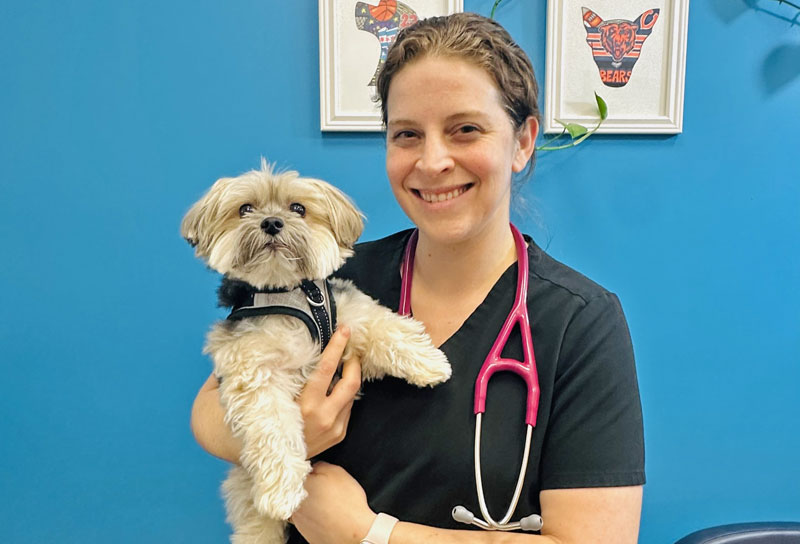
Hi everyone! My name is Dr. Amanda Hampton, and I am so excited to be joining the veterinary team at the Medical District Veterinary Clinic.
And I am so excited to meet you! Every person and pet has a different story with different needs. I look forward to getting to know you and finding out how I can best help you and your pet. Until then, here’s a little information for you about me.
My Path to Veterinary Medicine
I grew up in a small, rural community 2 hours west of Chicago, where I loved caring for my family’s personal cats and dogs. In high school, I started working as a paid kennel assistant at my hometown veterinary clinic, cleaning cages, learning about animal husbandry, and observing how the veterinary clinic operated.
That experience was so important and inspired me to pursue a career in veterinary medicine. I was recruited to swim at Western Illinois University, where I earned my undergraduate degree in biology and held part-time positions at a local veterinary clinic and grooming facility.
After undergrad, I was accepted into the University of Illinois College of Veterinary Medicine, where I completed my doctorate. During my time at the college, I loved participating in intramural sports. I eventually met my future husband playing flag football and basketball.
Leading in Practice
After graduation, I started my professional career working at a nationwide corporate preventive care practice where I held roles as a veterinarian, lead doctor, and chief of staff. I loved building the team, creating a culture of safety, and engaging the team to share ideas to improve patient care.
In 2020, the team won the practice’s Chicagoland Veterinary Quality Team of the Year, which was a proud moment in my career.
Eventually, I wanted to further advance and diversify my medical, surgical, and leadership experiences. In 2023, I started a full-time position at a smaller corporate practice. I also started working as a relief veterinarian here at the Medical District clinic and started helping to build their new community outreach program.
Fast forward two years, and now I get to be with them (and you!) full time!
I am so excited to share my passion for the veterinary profession with the clinic and the community. I love being a veterinarian, I love teaching, and I love being able to expose students to this profession.
Access to Veterinary Medicine for All
Accessibility and exposure to the profession are important, and this mindset allows me to honor those who have taught me while giving back to the students who will become the future of veterinary medicine.
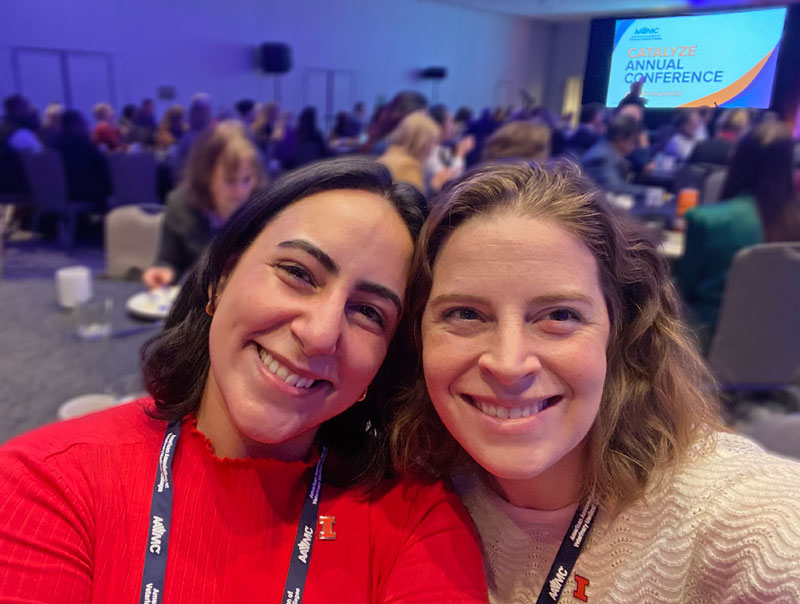
A large part of my recent volunteer work included building and co-leading the Diversity, Equity and Inclusion (DEI) committee of the Illinois State Veterinary Medical Association (ISVMA). The committee organizes veterinary student and veterinary professional networking and mentoring events and career fairs for high school students. (Check out the ISVMA “Veterinary Exploration Day” career fair held annually. This year it will be November 8 in Oakbrook, Illinois. Contact ISVMA for more information).
In 2022, the ISVMA DEI committee also helped facilitate transportation for Chicago area students to attend the annual Open House at the University of Illinois College of Veterinary Medicine in Urbana, Illinois. In addition to seeing all the exhibits available to the public, high school students attended a special Q&A with current veterinary students. This event has grown each year and now includes student access to the cultural houses on and tours of the main University campus through the Chicago Village Bus Program.
Ways to Get Involved
These outreach opportunities are an important part in expanding accessibility to care and to the profession. I look forward to seeing how our clinic’s community outreach team can continue to grow these efforts in the Chicago area.
If you are a high school student or guardian, career advisor, and/or community member who knows a student interested in the veterinary profession, please get in contact with us. Opportunities for high school students at our clinic include shadowing a clinician and attending our clinic’s open house for students in June. We also visit high schools to talk about the process of getting into veterinary and veterinary technician school.
Another plug: Vet Med Open House is open to everyone, family friendly, and lots of fun! And it’s free! We hope you get the opportunity to join the event in Urbana, Illinois, on Sunday, October 5.
Outside the Clinic
Outside of the veterinary clinic, I enjoy cooking, being outdoors, practicing yoga, going to Bulls games, and spending time with my family. I live on Chicago’s south side with my husband, who also a veterinarian; our 4-year-old daughter; and a senior Australian shepherd named Brickley.
I look forward to meeting you!
– Amanda Hampton, DVM (she/her/hers)
Take a Peek at My ‘Other’ Workplace
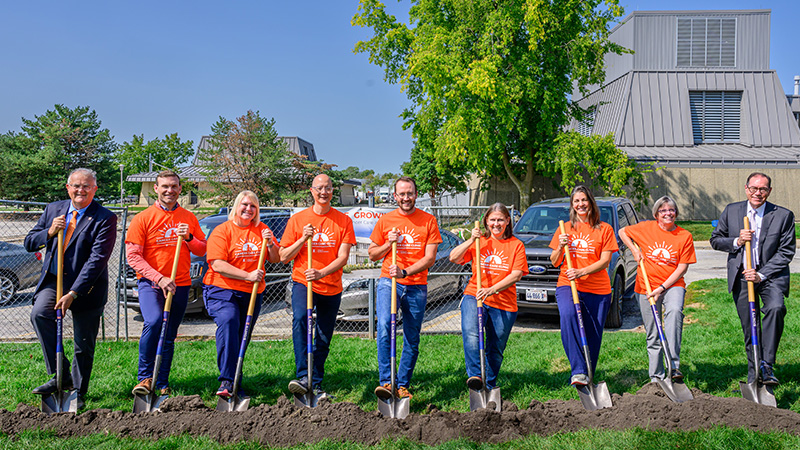
As many of you know, but others may not, in January I stepped into the role of interim director of the University of Illinois Veterinary Teaching Hospital in Urbana, while continuing to serve as medical director of Medical District Veterinary Clinic here in Chicago.
Unfortunately, a nationwide search for a permanent director of the teaching hospital did not result in a successful hire. The dean of the veterinary college has asked me to stay in my interim role through 2026, and I have agreed. While I am honored to help and enjoy the work in Urbana, I also miss seeing many of you and your pets.
Over the next two years I will remain actively involved in the daily operations of the Medical District clinic. I plan to continue seeing patients one day a week in Chicago. We are in the process of hiring another veterinarian for the Chicago clinic to help manage caseload and provide more availability for your pets.
In this blog, I want to tell you a little about the teaching hospital and showcase some exciting developments there.
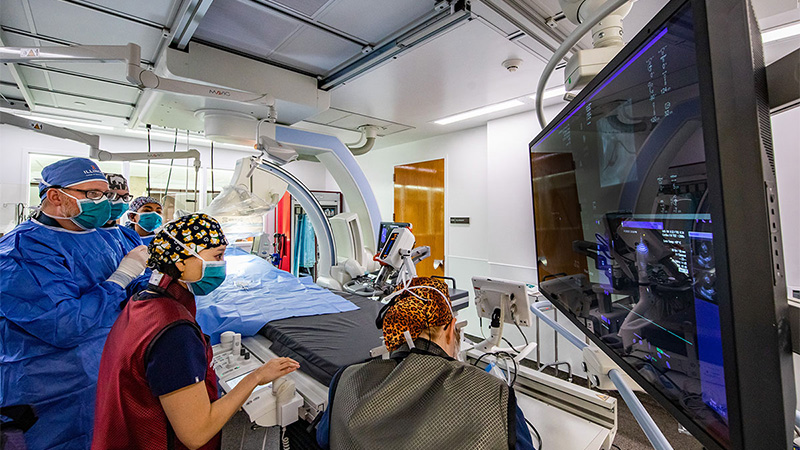
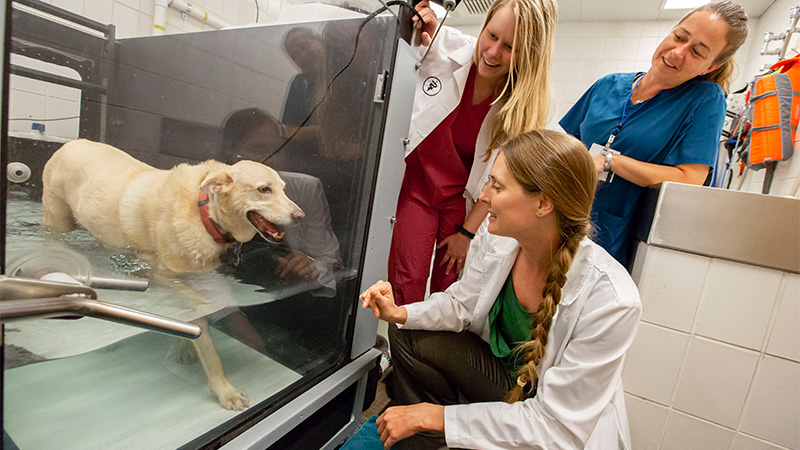
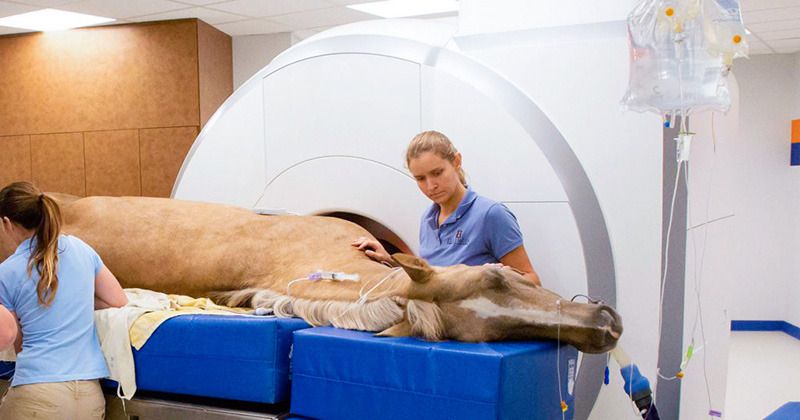
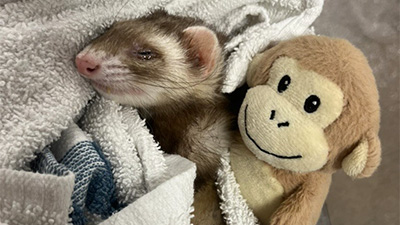
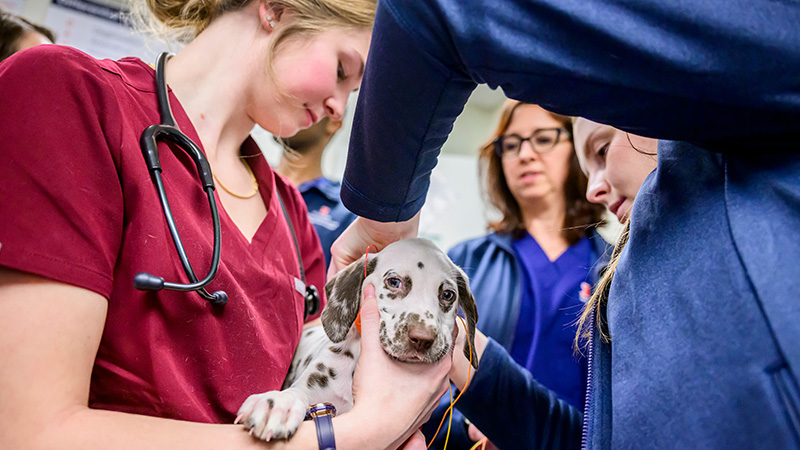
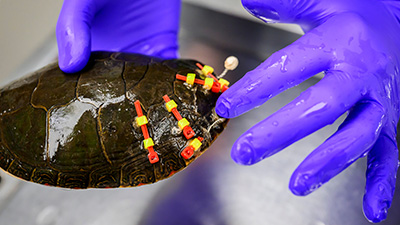
The Veterinary Teaching Hospital is a leading multi-specialty referral and emergency center, recognized nationally for its research, clinical care, and veterinary education. Organizationally within the College of Veterinary Medicine, the Medical District Veterinary Clinic is actually a satellite facility of the teaching hospital.
As interim director, I have the privilege of working alongside an exceptionally talented team of over 70 clinical faculty members and 180 support staff, across a wide range of specialties, from anesthesiology/pain management to cardiology, neurology, ophthalmology, and zoological medicine. In addition to the Medical District clinic, our facilities include the Small Animal Clinic, Large Animal Clinic, Midwest Equine, and Vet Med South Clinic.
Many features you’d expect in a human medical center can be found there:
- A linear accelerator for advanced radiation therapy
- A 3-Tesla MRI and CT scanner for high-resolution imaging
- Eight small animal surgery suites, including an interventional suite for procedures such as surgical repair of heart defects
- Advanced imaging and surgical capabilities for equine and food animal patients.
We also provide 24-hour emergency services for all domestic species, a wildlife medical clinic, rehabilitation therapy, and much more.
It’s an exciting time to be part of the teaching hospital. A new $21 million addition for our oncology service should be completed by the end of next year. This expansion will allow us to treat more animals with cancer and continue advancing cancer treatment options through research.
You might be surprised how far animal owners travel to access the resources at the University of Illinois Veterinary Teaching Hospital. They come from all across the state of Illinois, from both coasts, and even other countries! For anyone who needs advanced or specialty veterinary care, I strongly encourage looking into the options available in Urbana. Thank you for your continued support, and I look forward to seeing many of you in the clinic over the next few years.
— Dr. Drew Sullivan, Medical Director
La Importancia de la Diversidad en la Medicina Veterinaria
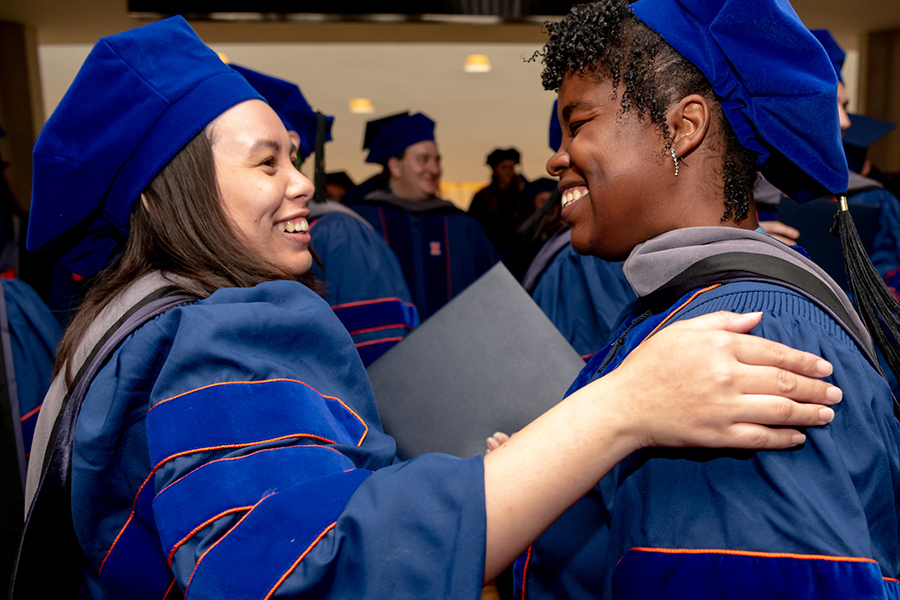
En honor al Mes de La Historia Afroamericana, profundizaremos en por qué la diversidad es importante en la medicina veterinaria.
La diversidad en la medicina veterinaria no es solo un imperativo moral; es una necesidad para el avance del campo y la provisión de atención equitativa a todos los animales. Sin embargo, a pesar del reconocimiento creciente de su importancia, persisten disparidades en la representación de grupos minoritarios dentro de los programas veterinarios.
Mejor Acceso a la Atención
Las comunidades minoritarias a menudo enfrentan barreras para acceder a la atención veterinaria, incluyendo factores socioeconómicos, lenguaje, diferencias culturales y ubicación geográfica. Con solo 1.3% de veterinarios afroamericanos/negros y 7.9% hispanos/latines reportados en 2023, al aumentar la diversidad dentro de la profesión veterinaria, podemos comprender y abordar mejor las necesidades únicas de estas comunidades, asegurando que todos los animales reciban la atención que merecen.
Innovación y Resolución de Problemas
Los equipos diversos son más hábiles para resolver problemas e innovar debido a la variedad de perspectivas y enfoques que aportan. En la medicina veterinaria, esta diversidad de pensamiento puede llevar a soluciones creativas para desafíos complejos, desde la prevención de enfermedades hasta las metodologías de tratamiento.
Representación y Modelos a Seguir
Aumentar la diversidad dentro de los programas veterinarios, sean doctores, enfermeros, asistentes, o personal de recepción, presenta una oportunidad para los grupos subrepresentados modelos a seguir y mentores a quienes pueden relacionarse e inspirarse para emular. Esta representación es esencial para inspirar a las futuras generaciones de profesionales veterinarios diversos y derribar barreras de entrada al campo.
Estadísticas sobre las Tasas de Aceptación para Minorías
Aunque ha habido avances en el aumento de la diversidad dentro de los programas veterinarios, persisten disparidades en las tasas de aceptación para estudiantes de minorías. Según datos recientes:
- Los estudiantes afroamericanos/negros constituyen solo un pequeño porcentaje de los solicitantes y matriculados en escuelas de veterinaria, con tasas de aceptación significativamente más bajas que las de sus contrapartes blancos.
- Los estudiantes hispanos/latines también están subrepresentados en los programas veterinarios, enfrentando barreras como acceso limitado a recursos educativos y limitaciones financieras.
- Los estudiantes indígenas/nativos americanos están entre los grupos más subrepresentados en la medicina veterinaria, con tasas de aceptación muy por debajo del promedio nacional.
A pesar de los esfuerzos para promover la diversidad y la inclusión dentro de la educación veterinaria, estas estadísticas resaltan la necesidad de defensa y acción continuas para abordar barreras sistémicas y aumentar el acceso a programas veterinarios para estudiantes de minorías.
Conclusión
La diversidad no es solo una palabra de moda; es un aspecto fundamental de la medicina veterinaria que enriquece la profesión y mejora la calidad de la atención proporcionada a los animales. Con 25% de grupos subrepresentados componiendo la clase de 2025 en el Colegio de Medicina Veterinaria en la Universidad de Illinois, seguiremos los esfuerzos para aumentar la representación y abordar las disparidades en las tasas de aceptación para minorías. Podemos construir una fuerza laboral veterinaria más inclusiva que refleje la diversidad de las comunidades a las que servimos. Es hora de reconocer la importancia de la diversidad en la medicina veterinaria y tomar medidas significativas hacia la creación de una profesión más equitativa e inclusiva.
—Dr. Ana Valbuena
The Importance of Diversity in Veterinary Medicine
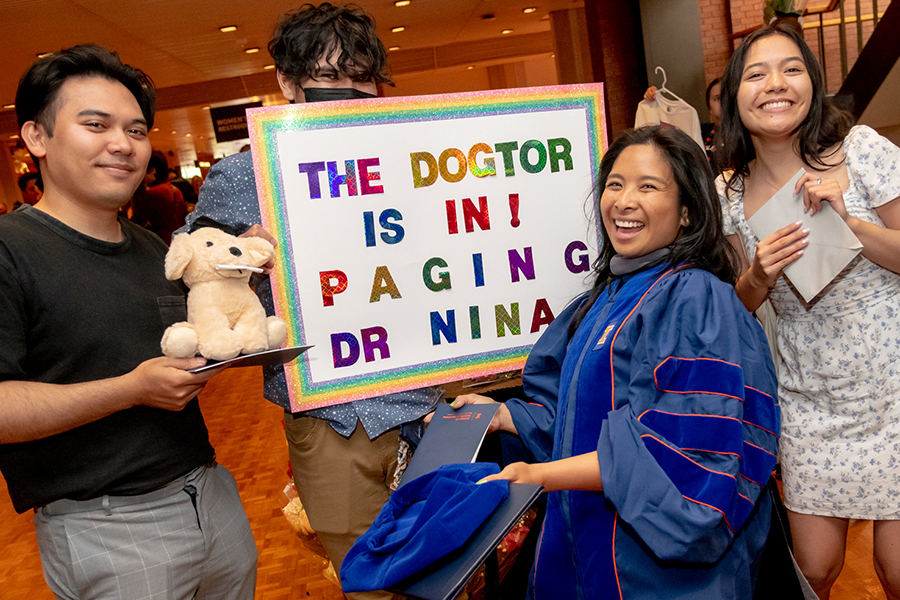
Diversity in veterinary medicine is not just a moral imperative; it’s a necessity for advancing the field and providing equitable care to all animals. However, despite the growing recognition of its importance, disparities persist in the representation of minority groups within veterinary programs.
In honor of Black History Month, we will delve into why diversity is important in veterinary medicine.
Better Access to Care
Minority communities often face barriers to accessing veterinary care, including socioeconomic factors, language barriers, cultural differences, and geographical location. According to the Bureau of Labor Statistics, among all U.S. veterinarians in 2023 only 1.3% are African American/Black veterinarians and 7.9% are Hispanic/Latinx veterinarians. Increasing diversity within the veterinary profession allows us to better understand and address the unique needs of these communities, ensuring that all animals receive the care they deserve.
Innovation and Problem Solving
Diverse teams are more adept at problem-solving and innovation due to the variety of perspectives and approaches they bring. In veterinary medicine, this diversity of thought can lead to creative solutions for complex challenges, from disease prevention to treatment methodologies.
Representation and Role Models
Increasing diversity within veterinary programs, whether doctors, nurses, assistants, or reception staff, provides an opportunity for underrepresented groups to find role models and mentors they can relate to and aspire to emulate. This representation is essential for inspiring future generations of diverse veterinary professionals and breaking down barriers to entry into the field.
Statistics on Acceptance Rates for Minorities
Although there have been advances in increasing diversity within veterinary programs, disparities persist in acceptance rates for minority students. According to recent data:
- African American/Black students make up only a small percentage of applicants and enrollees in veterinary schools, with significantly lower acceptance rates than their white counterparts.
- Hispanic/Latinx students are also underrepresented in veterinary programs, facing barriers such as limited access to educational resources and financial constraints.
- Indigenous/Native American students are among the most underrepresented groups in veterinary medicine, with acceptance rates far below the national average.
Despite efforts to promote diversity and inclusion within veterinary education, these statistics highlight the need for continued advocacy and action to address systemic barriers and increase access to veterinary programs for minority students.
Conclusion
Diversity is not just a trend; it’s a fundamental aspect of veterinary medicine that enriches the profession and improves the quality of care provided to animals. For the past four years, the incoming class of students at the College of Veterinary Medicine at the University of Illinois has been made up of one-quarter students from underrepresented groups. We will continue efforts to increase representation and address disparities in acceptance rates for minorities. We can build a more inclusive veterinary workforce that reflects the diversity of the communities we serve. It’s time to recognize the importance of diversity in veterinary medicine and take meaningful steps toward creating a more equitable and inclusive profession.
—Dr. Ana Valbuena
Welcome, Dr. Barragan!
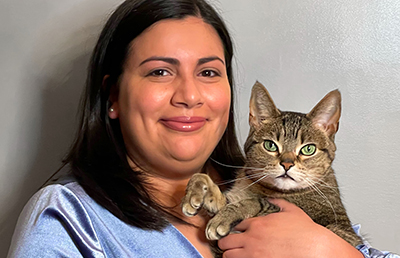
The Medical District Veterinary Clinic is excited to introduce Dr. Jeanette Barragan, who joins our practice on June 15. Dr. Barragan has lived on the southwest side of Chicago her whole life – except for the nine years she attended the University of Illinois Urbana-Champaign for a bachelor’s degree in integrated biology, a minor in chemistry, and to earn her veterinary degree.
For the past two years she has practiced in a Naperville clinic, and she is looking forward to becoming part of the care team at the Medical District Veterinary Clinic.
“I have actually been bringing my own cats to the Medical District Veterinary Clinic since before I entered my veterinary studies,” she says. “I was always impressed by the friendly staff and the high standards of care the doctors provided.”
My focus as a practitioner is to provide outstanding preventative and medical care, and to develop lifelong relationships with my patients and their families.
Dr. Jeanette Barragan
The collaborative atmosphere of a multi-doctor practice will be a welcome change for Dr. Barragan, who has been the sole veterinarian at the clinic in Naperville. She’s also eager to see a more diverse clientele at the Harrison Street location, which will reflect the neighborhood she grew up in.
“My focus as a practitioner is to provide outstanding preventative and medical care, and to develop lifelong relationships with my patients and their families,” she says. “My goal is to build trust with pet owners by ensuring the best experience for them. That means offering a variety of treatment options and supporting my clients as they choose what’s right for their family.”
Dr. Barragan’s dream of becoming a veterinarian started when she was just a child. As she pursued this goal, she realized that community outreach and serving pet owners without access to quality veterinary care was something she wanted to incorporate into her professional life. She also hopes to get involved at animal shelters in her time away from the clinic.
Her own pet family currently consists of three cats: Mia, Finn, and Dory. “Of course, I love caring for all dogs and cats, but I am partial to cats,” she admits.
Welcome, Dr. Calderon!
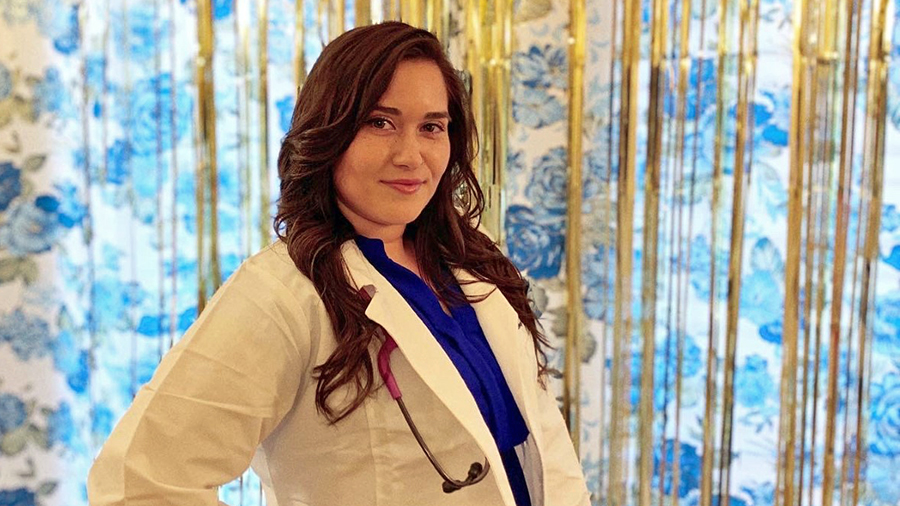
Dr. Angélica Calderón has been a proud U of I student ever since attending the University of Illinois at Chicago and obtaining her bachelor’s degree in biological sciences and psychology. She went on to attend the University of Illinois College of Veterinary Medicine Urbana-Champaign to obtain her doctorate in veterinary medicine.
Born and raised in Chicago—and not scared away by the snow (yet)—she is excited to practice veterinary medicine at the Medical District Veterinary Clinic starting June 15.
Dr. Calderón spent a week learning at our clinic when she was a first-year veterinary student and later worked here as an assistant on her spring and winter breaks during veterinary school.
“I loved everyone at the clinic so much,” she says. “I knew that was where I wanted to practice once I graduated from veterinary school.”
As she starts her veterinary career, Dr. Calderón proudly states, “This is a very exciting time in my life. I’m living the dream I had always wished for and want to make a difference in the lives of many pets out there.”
She has a passion for small animal medicine and is very interested in small animal dentistry and imaging, including ultrasonography and radiology. In veterinary school she volunteered at the Wildlife Medical Clinic, and she also has an interest in small exotic companion animals.
“I’m very excited to start my career and see where life takes me,” she says.
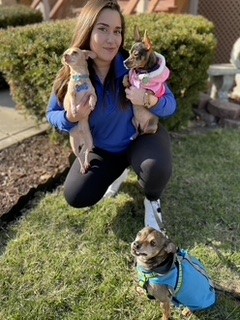
In her free time Dr. Calderón enjoys spending time with her family and significant other. “It has been very hard to be away from them for the past four years since starting veterinary school,” she says.
She also enjoys cuddling next to her various fur babies (Daisy, Wendy, Simba, Mickey, Nino, Princess, and Bebe).
“They’re all chihuahuas, so it’s basically one large dog,” she jokes.
And if seven chihuahuas wasn’t enough, she also cares for various other pets, including Sparky, a red Amazon parrot; Cotorrito, a Quaker parrot; two cockatiels; four parakeets; and a 20-gallon fish tank filled with mollies, guppies, snails, ghost shrimp, and an albino catfish. When she’s not at her personal home zoo, she’s catching a baseball game or out enjoying the city.
Dra. Angélica Calderón siempre ha sido una orgullosa estudiante de la Universidad de Illinois desde que asistió a la Universidad de Illinois en Chicago y recibió su bachillerato de Biología y Psicología, a asistir y graduarse del Colegió de Medicina Veterinaria de la Universidad de Illinois en Urbana Champaign.
Nacida y criada en Chicago, Illinois y no asustada por la nieve (todavía), se quedará en el área de Chicago para ejercer la carrera de medicina veterinaria en la Clínica Veterinaria del Distrito Médico. Ella visitó nuestra clínica en su primer año de ser estudiante, e incluso trabajó aquí como asistente en sus vacaciones de primavera e invierno.
“Quería tanto a todos en MDVC que sabía que era allí donde quería trabajar cuando me graduara de la escuela de veterinaria”.
Siendo una recién graduada y ahora comenzando su carrera veterinaria, Dra. Calderón dice con orgullo, “Este es un momento muy emocionante en mi vida. Estoy viviendo el sueño que siempre había deseado y quiero marcar la diferencia en la vida de muchas mascotas”.
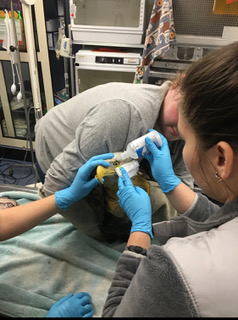
Dra. Calderón tiene una pasión por la medicina de animales pequeños y está muy interesada en la odontología y radiología incluidas la ultrasonografía. Mientras estaba en la escuela, fue voluntaria en la Wildlife Medical Clinic y desde ahí tuvo interés en los animales de compañía exóticos.
“Estoy muy emocionada de comenzar mi carrera y ver a dónde me lleva la vida”.
En su tiempo libre, disfruta pasar tiempo con su familia y su pareja, ya que ha sido “muy difícil estar lejos de ellos durante los últimos 4 años desde que comencé la escuela de veterinaria”.
También le gusta acurrucarse junto a sus varias mascotas (Daisy, Wendy, Simba, Mickey, Nino, Princess, Bebe) “todos son chihuahuas, así que básicamente es un perro grande”.
Y si eso no fuera suficiente, también cuida a varias otras mascotas, como Sparky un loro rojo del Amazonas, Cotorrito un loro cuáquero, dos cacatúas, 4 periquitos y una pecera de 20 galones llena de mollys, guppys, caracoles, camarones fantasma y un bagre albino. Si no está en el zoológico personal de su casa, está viendo un partido de béisbol o disfrutando de la bella ciudad de Chicago.
Welcome, Dr. Valbuena!
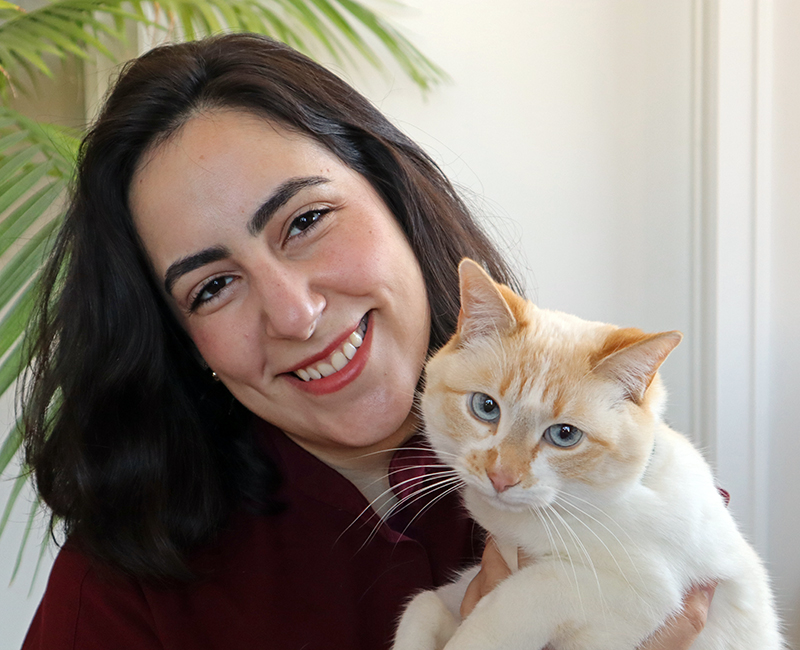
Medical District Veterinary Clinic is excited to announce the May 16 arrival of Dr. Ana Valbuena. She joins us after three years in practice at a Lincoln Park clinic and brings a strong commitment to low-stress handling for pets and people.
“I really want pet owners to see that they are members of the care team,” she says. “I want everyone to be part of the examination and the conversation.”
She also brings a multinational life history: she was born in Cuba, raised in Nicaragua, and lived in Miami, Fla., before coming to Illinois for school. By comparison, her route to a veterinary career has been an unwavering straight line.
“My parents will tell you I’m a very decisive person,” says Dr. Valbuena. “Since a young age there has never been any doubt in my mind about being a veterinarian.” Once she set her mind to this goal, she was determined to overcome any obstacles.
Dedicated to Helping Clients
She recalls that in the Hispanic community in Florida, accessing veterinary care was often very daunting. “There were many barriers besides just the language barrier,” she says. “People felt they couldn’t do it on their own.”
Seeing those barriers, and discovering after completing her veterinary degree that there were so few bilingual veterinarians in practice, motivates Dr. Valbuena to be a resource for pet owners who feel more comfortable communicating in Spanish than in English. We know this skill will be a wonderful asset for our clients.
“My first few years in practice I spent time learning who I am as a veterinarian and what kind of practice I want to be in,” she says. “I want to be someone who can reduce stress for other people, whether that is clients whose first language is Spanish or soon-to-be veterinarians who need encouragement to make a confident transition into being a practicing veterinarian.”
Instilling Confidence in Students
As a fourth-year veterinary student at the University of Illinois, Dr. Valbuena completed a clinical rotation at the Medical District Veterinary Clinic. She really loved the clinic culture and clientele, so when a position opened up here, she jumped at the chance to join the practice.
She says regularly engaging with veterinary students from Urbana while serving clients at the Medical District Vet Clinic will be a huge positive for her.
“Students who are at the midway point between being at the university and being in the real world can benefit so much from their time in our clinic,” she believes. “It’s a chance for them to shape what sort of practitioner they will be. I look forward to telling them ‘You got this!’ They can learn to have confidence in themselves and not feel that they must be perfect. The transition doesn’t have to be scary.
“That’s another aspect of the low-stress philosophy embraced at Medical District Veterinary Clinic! We minimize stress not only for our animal patients and clients, but also for the students who will soon be veterinarians.”
A Soft Spot for Cats
Dr. Valbuena has a particular fascination for feline behavior. “I love helping owners gain deeper insights into these strange misunderstood little creatures,” she says.
“While people know their cats very well, the cats may be giving subtle signs that their people overlook. By learning about these silent signals, owners may be able to spot medical problems earlier.
“I love helping in little ways that make things better for the cat and for the people!”
Her own family includes a ginger cat named Weasley (after Ron and his ginger siblings in Harry Potter) and a cat named Ziggy (because Dr. Valbuena is a huge fan of David Bowie). The name of her hamster, Armie Hamster, seems self-explanatory.
Dr. Valbuena enjoys city life and the diversity Chicago offers. After spending most of her life closer to the tropics, she is also surprisingly enamored of experiencing four seasons in Illinois.
“Some people are not happy with winter weather, but I find it so interesting and a fun time!”
Nos complace darle la bienvenida a la Dra. Ana Valbuena a Medical District Veterinary Clinic. Ella se une a nosotros después de tres años en una clínica en Lincoln Park y trae con ella un enfoque en el manejo de bajo estrés para mascotas.
“Realmente quiero que los dueños de las mascotas vean que son miembros del equipo”, dijo la Dra. Valbuena. “Quiero que todos sean participe en la conversación sobre el cuido de su mascota”.
También trae una historia de vida multinacional: nació en Cuba, se crió en Nicaragua y vivió en Miami, Florida, antes de venir a Illinois para sus estudios. En comparación, su ruta a la carrera veterinaria ha sido una línea recta e invariable.
“Mis padres te dirían que soy una persona muy determinada”, dice la Dra. Valbuena. “Desde muy joven, nunca dudé que sería veterinaria”. Una vez que se fijó en su mente en este objetivo, estaba decidida a superar cualquier obstáculo.
Dedicada a ayudar a los clientes
Ella recuerda que en la comunidad Hispana en Florida, el acceso a la atención veterinaria podía ser muy intimidante. “Hay muchas barreras además del idioma”, dice. “Es fácil sentirse que uno no puede hacerlo por su cuenta”.
El ver esas barreras, y descubrir que hay tan pocos veterinarios bilingües, motiva a la Dra. Valbuena a ser un recurso para aquellos que se sienten más cómodos comunicándose en español. Nosotros sabemos que el ser bilingüe sera maravilloso para nuestros clientes.
“Pase los primeros años de mi carrera descubriendo quién soy cómo veterinaria y en qué tipo de clínica quiero estar”, dice. “Quiero reducir el estrés para otros; ya sean clientes de habla hispana o futuros veterinarios que necesitan animo y apoyo para completar la transición de estudiante a profesional”.
Infundir confianza en los estudiantes
La Dra. Valbuena completó una rotación clínica en Medical District Veterinary Clinic en su cuarto año como estudiante en la Universidad de Illinois y se enamoró del ambiente de la clínica y los clientes. Cuando se enteró del puesto disponible, aprovecho la oportunidad de unirse a la clinica.
Ella mira la oportunidad de trabajar con los estudiantes de Urbana mientras atiende a los clientes en el Medical District Vet Clinic como algo muy positivo.
“Estudiantes que están en el punto medio entre estar en la universidad y ser profesionales pueden beneficiarse mucho de su tiempo en nuestra clínica”, cree la Dra. Valbuena. “Es una buena oportunidad para que los estudiantes empiezen a pensar que tipo de veterinario quieren ser. Me emociona saber que voy a poder ayudarlos y decirles ‘¡Lo que está para ti, nadie te lo quita! ¡Creo en ti!” Espero que pueda ayudarlos a tener confianza en sí mismos y que sepan que no tienen que ser perfectos. No le tienen que tener miedo a la transición.
“¡Ese es otro aspecto de la filosofía de bajo estrés adoptada por Medical District Veterinary Clinic! Minimizamos el estrés no solo para nuestros pacientes animales y clientes, sino también para los estudiantes veterinarios”.
Intrigada por los gatos
La Dra. Valbuena tiene una fascinación particular por el comportamiento felino. “Me encanta ayudar a profundizar el conocimiento de los gatos, ya que estas criaturas pequeñas a veces son mal entendidas”, dice.
“Aunque los dueños conocen muy bien a sus gatos, los gatos suelen señalar sus emociones de una forma sutil. Al aprender sobre estas señales, podemos ayudar a detectar problemas más temprano.
“¡Me encanta mejorar la relacion entre los dueños y sus gatos!”
Su propia familia incluye un gato de pelirrojo llamado Weasley (en honor a Ron y sus hermanos pelirrojos en Harry Potter), un gato llamado Ziggy (porque la Dra. Valbuena es fan de David Bowie) y un hámster llamado Armie Hamster.
La Dra. Valbuena disfruta de la vida de la ciudad y las diversas oportunidades que ofrece Chicago. Después de pasar la mayoría de su vida en climas mas tropicos, ahora puede disfrutar de las cuatro estaciones en Chicago.
“¡Muchos no disfrutan el clima invernal, pero me parece muy interesante y divertido!”
Introducing Telemedicine for Patients

Due to the extended stay-at-home order, starting Monday, April 13, Medical District Veterinary Clinic will offer telemedicine appointments to continue to support our clients.
Please review the following information before you schedule an appointment:
- All telemedicine appointments are for established patients who have been seen within the past 12 months. These patients have a current Veterinary-Client-Patient Relationship (VCPR), making telemedicine a legally acceptable form of care
- Telemedicine appointments can be scheduled for non-emergency sick patients. For example: skin issues, ear infections, lameness, management of chronic conditions, diarrhea, and behavior issues. These appointments will be a convenience for clients, will allow doctors to service more of our clients, and will decrease person-to-person contact.
- Telemedicine appointments can be scheduled:
- If the patient is sick and the client is also sick/quarantined/has been exposed to illness
- If the pet is ill and the client cannot come into the clinic for other reasons
- If the pet’s illness is not emergent but should be discussed with a doctor
- Telemedicine appointments will be available Mondays, Wednesdays, and Fridays, between 8 am and 12 pm. (This may change based on demand.)
- The cost of telemedicine appointments is $30.
- If during the telemedicine appointment, the doctor deems that the pet should be physically seen, the $30 telemedicine fee will still apply. The exam fee for the in-clinic appointment will be discounted to $40 (from $62) if the in-clinic appointment is scheduled and seen within 72 hours of the telemedicine appointment.
Photo by Andrea Piacquadio from Pexels
We’re Here to Support You
Dear Clients and Patients:
I’m writing to let you know that we are here to help you through this tough time.
While this COVID-19 pandemic disrupts our normal lives, we want to provide you with reassurance that Medical District Veterinary Clinic is available to help when your pet has needs. At the same time, as members of the medical community, we have an obligation to help protect the health and safety of our community.
We as veterinarians have taken an oath not only to protect the health and welfare of animals, but also to promote public health. Currently, we are in a public health crisis, and we want to encourage all our clients to do their part and stay home whenever possible.
Due to this crisis, we are working with limited staff and practicing social distancing wherever possible. We have made the following changes to our procedures so that we can meet our clients’ needs while adhering to guidelines for limiting the spread of COVID-19.
- We are seeing urgent appointments only.
- All owners will be asked to wait in their car during appointments. Doctors will communicate exam findings over the phone and discuss diagnostics.
- Payment will be collected over the phone, and the pet will be returned to the car after procedures are completed.
- Vaccinations:
- Puppy and kitten vaccines: We feel these vaccines are very important to the health and safety of these patients and should be continued on recommended normal schedule.
- Adult pet vaccines: Although vaccines are very important, some vaccinations could be postponed 1 to 2 months, especially for dogs with limited social interaction. If your pet is due for vaccinations, please call us to discuss scheduling options.
- Medication pick-up: Curbside service is now available. The owner will be asked to pay over the phone, and medications will be brought to the car.
Thank you for your understanding as we navigate this difficult time. We hope to resume normal operation in early May and will keep you updated as the situation evolves.
If you need additional resources please refer to our Pet FAQ’s.
Drew Sullivan, DVM
Medical Director
Reduced Service: Seeing Sick Patients Only
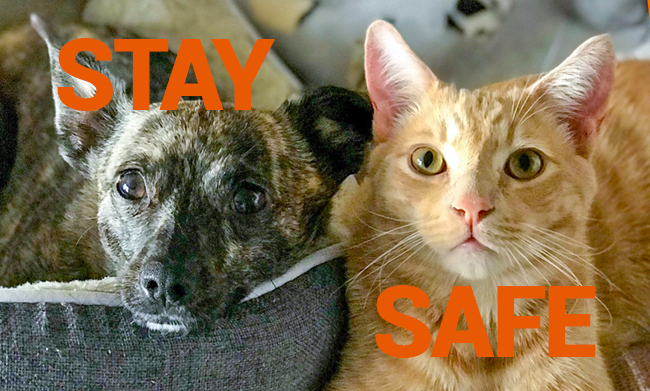
The situation is very fluid. Please check this post or our Facebook page for updates.
Last updated March 17.
With recent developments in COVID-19, Medical District Veterinary Clinic is implementing reduced service in order to keep our staff, clients, and community safe. (Remember, your pets are not at risk from COVID-19, but having people bringing their pets to a public place increases the risks for people.)
We will continue to see SICK patients only; wellness and routine procedures will be postponed.
If your pet is due for a crucial vaccine, such as rabies, and your pet goes to daycare or boarding, please contact us to find out if an exception can be made.
If you have a fever, cough, sore throat, or possible exposure to COVID-19, please do not come to the clinic. Arrange for someone else to bring your sick pet to see us.
Stay safe! We all need to work together—but at least 6 feet apart—to implement these public health measures.
Thank you for your understanding and cooperation! We have the best clients in Chicago! ♥
Thanksgiving Holiday Hours 2019
Our clinic will close at 4 pm on Wednesday, Nov. 27, for the Thanksgiving holiday. We reopen at 7 am on Saturday, Nov. 30.
Wishing everyone a warm and happy holiday!
If you need emergency veterinary care while we are closed, please visit MedVet Chicago, 3123 N. Clybourn Ave., Chicago; (773) 281-7110.

![[dog near gourds]](/blog/wp-content/uploads/2019/11/thanks-dog_web.jpg)